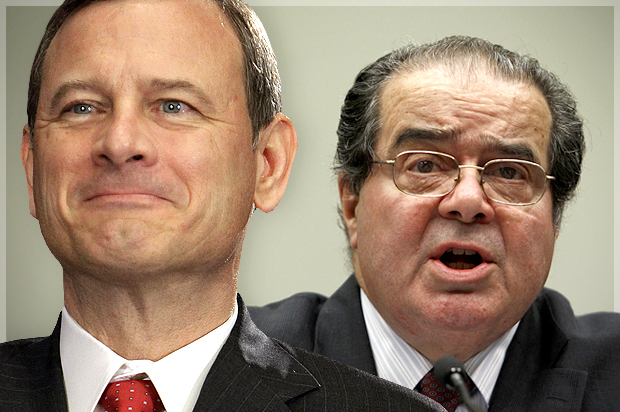Gay marriage had been on a seemingly unstoppable winning streak since last summer’s Supreme Court decision in United States v. Windsor, in which the Justices struck down the federal Defense of Marriage Act (DOMA). Since then, courts have found bans on same-sex marriage unconstitutional a whopping 30 times.
But that streak came to a quick end last week, when a district judge in Tennessee broke from the pack and upheld the state’s ban on gay unions, finding that marriage “cannot be divorced from its traditional procreative purposes.”
More bad news may be on the horizon.
The Sixth Circuit Court of Appeals, which covers Tennessee, recently heard a challenge to gay-marriage bans in four states. While the three-judge panel has yet to rule, it has a reliable liberal and a staunch conservative on the bench; according to court-watchers, Judge Jeffrey Sutton—appointed by President George W. Bush—seemed reluctant to enact marriage equality by judicial fiat.
Gay-marriage supporters, however, shouldn’t fret. Conflicting rulings in lower courts only make it more likely the Supreme Court will be forced to weigh in—if Justice Ruth Bader Ginsburg is right, either in the spring term or next fall. When it does, there’s every indication the Court will rule in favor of gay marriage.
Little more than a year after declining to rule on gay marriage directly in the challenge to California’s Proposition 8—the Justices restored same-sex marriage to the state on a technicality—the Supreme Court once again has lawyers banging on its door. In the last few weeks, opponents of same-sex unions in two appellate courts—the Fourth and Tenth circuits—have appealed rulings in favor of marriage equality. The Court will decide sometime this fall whether to hear the cases. While the Justices can vote to take any case they’ve been asked to consider, they typically give priority to those in which there is a split among the courts. A ruling from the Sixth Circuit upholding bans on same-sex marriage would create a split among the appellate courts, practically forcing the Justices’ hand.
There’s another reason the Court will have to rule on gay marriage soon. Justice Anthony Kennedy’s majority opinion in Windsor—the DOMA case—was vague. He found that the federal ban on recognizing same-sex unions in the states was intended to “injure” gay couples and that it violated the Equal Protection and Due Process clauses of the Constitution. But he wasn’t clear about the legal reasoning behind his conclusion.
Most lower courts have taken the hint—if the federal ban on recognizing gay marriages is unconstitutional, similar laws at the state level should be as well. But that’s only an inference. Lower courts have had to come up with their own legal justifications for striking down same-sex marriage laws, and their reasons vary widely.
Over the years, the Supreme Court has come up with a well-defined rubric for judging whether laws violate the Equal Protection or Due Process clauses. All things being equal, laws have to pass what’s known as “rational basis review.” Basically, if the judge can come up with any conceivable interest the government might have in enacting the law, it gets a pass. Given that low bar, all but the most ludicrous laws survive rational basis review.
But laws that target an unpopular minority group or that curtail a “fundamental right” like freedom of speech have to pass a tougher test. They must be narrowly crafted to achieve a “compelling state interest”—for instance, national security. What’s more, the law in question also has to be the only way of achieving its intended goal. In striking down Obamacare’s contraception mandate, Justice Samuel Alito found that the mandate failed this standard because it curtailed religious liberty—a fundamental right—and that the government could achieve its goal without burdening Hobby Lobby—namely, by providing contraception coverage itself.
In striking down DOMA, Justice Kennedy didn’t indicate whether he was using a heightened level of judicial review. Nor did he say that marriage was a fundamental right for gay couples. Rather, he seems to have ruled DOMA unconstitutional because it was intended to hurt gay people—or, in lawyer-speak, motivated by “animus.” So while the vast majority of the court decisions since the DOMA ruling have found bans on same-sex marriage unconstitutional, their reasons have varied widely. Some have struck down gay-marriage bans using the rational basis standard, while others have said the decision calls for a heightened level of scrutiny.
The vagueness of Justice Kennedy’s opinion also gave the Tennessee judge the wiggle room to uphold the state’s ban on gay marriage. In finding the law constitutional, the judge noted that the Supreme Court could have addressed the issue of gay marriage explicitly but chose not to. Because of this, the Tennessee judge said the Court’s 1972 ruling in Baker v. Nelson—in which the Justices upheld a Minnesota law limiting marriage to heterosexual couples—still held.
Justice Kennedy’s exercise in judicial restraint has come back to haunt him. In overturning DOMA without fully explaining why, he left lower courts to come up with their own standards for judging gay-marriage bans across the country. In the end, this has only hastened the day the Supreme Court will have to fully explain itself on gay marriage. Given that Justice Kennedy is the tie-breaker on the Court and that we already know where his sympathies lie—in addition to authoring the Windsor decision, he also wrote the majority opinion in 2003’s Lawrence v. Texas case, which overturned state bans on sodomy—gay-marriage proponents can expect a victory.

